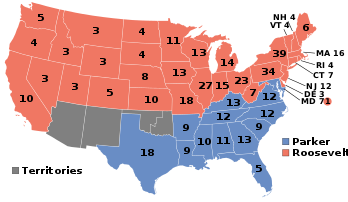The 1904 United States elections elected the members of the 59th United States Congress. It occurred during the Fourth Party System. Republicans maintained control of the presidency and both houses of Congress. For the first time since the 1828 election, no third party or independent won a seat in Congress.
| ← 1902 1903 1904 1905 1906 → Presidential election year | |
| Election day | November 8 |
|---|---|
| Incumbent president | Theodore Roosevelt (Republican) |
| Next Congress | 59th |
| Presidential election | |
| Partisan control | Republican hold |
| Popular vote margin | Republican +18.8% |
| Electoral vote | |
| Theodore Roosevelt (R) | 336 |
| Alton Parker (D) | 140 |
 | |
| 1904 presidential election results. Red denotes states won by Roosevelt, blue denotes states won by Parker. Numbers indicate the electoral votes won by each candidate. | |
| Senate elections | |
| Overall control | Republican hold |
| Seats contested | 30 of 90 seats[1] |
| Net seat change | Democratic -1[2] |
 | |
| Results of the elections: Democratic gain Democratic hold Republican gain Republican hold Legislature failed to elect | |
| House elections | |
| Overall control | Republican hold |
| Seats contested | All 386 voting members |
| Net seat change | Republican +45[2] |
| Gubernatorial elections | |
| Seats contested | 33 |
| Net seat change | Democratic +2 |
 | |
| 1904 gubernatorial election results
Democratic gain Democratic hold | |
In the presidential election, Republican President Theodore Roosevelt defeated Democratic judge Alton Parker from New York.[3] Parker, a conservative Bourbon Democrat, won the Democratic nomination on the first ballot, as former President Grover Cleveland and former presidential nominee William Jennings Bryan both declined to run. Roosevelt dominated both the popular vote and the electoral college, carrying every state outside the South. Roosevelt, who succeeded William McKinley after the latter was assassinated in 1901, became the first vice president to succeed to the presidency and later win election to the presidency in his own right. The election also saw Florida hold the first presidential primary, although Florida delegates were not bound by the results of the primary.[4]
Republicans won major gains in the House, boosting their majority.[5]
In the Senate, the Republicans picked up one seat, and maintained a commanding majority.[6]
See also
editReferences
edit- ^ Not counting special elections
- ^ a b Congressional seat gain figures only reflect the results of the regularly-scheduled elections, and do not take special elections into account.
- ^ "1904 Presidential Election". The American Presidency Project. Retrieved 25 June 2014.
- ^ Farrington, Brendan (31 January 2012). "Florida Primary Election 2012: State Broke Rules Again To Hold Early Contest". Huffington Post. AP. Retrieved 9 September 2015.
- ^ "Party Divisions of the House of Representatives". United States House of Representatives. Retrieved 25 June 2014.
- ^ "Party Division in the Senate, 1789-Present". United States Senate. Retrieved 25 June 2014.
